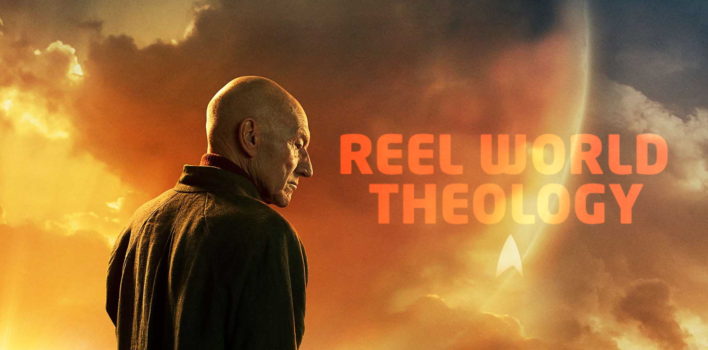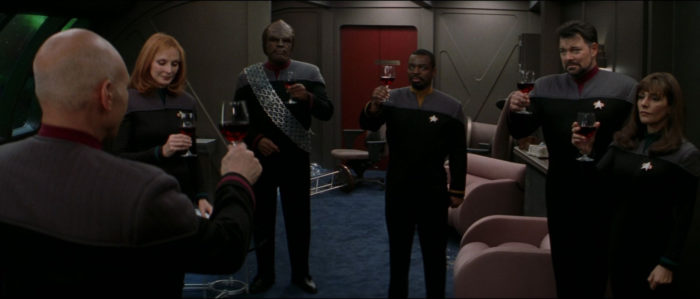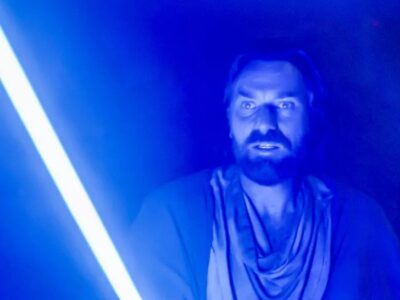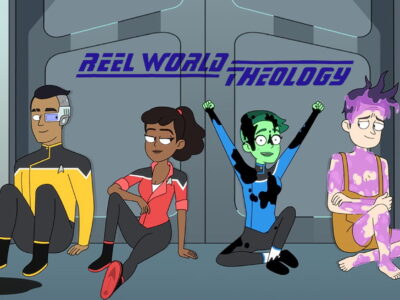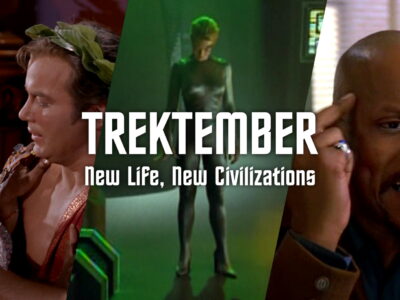“Nepenthe” – Star Trek: Picard S1E07
There are certain things in this episode that cannot go unaddressed. To begin with, it sees the return of Will Riker and Deanna Troi. This provides us with a new vision of one of the most beloved and archetypal symbols of integrity, courage, and nobility in Star Trek.
I am speaking, of course, of Riker’s beard.
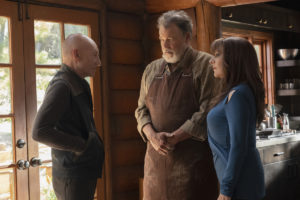 As with all our old friends represented here, age has not only left Will Riker’s beard undiminished; it has made it more of what it was—bold, imposing, and distinguished. The Riker beard has long stood as a beacon on a hill to all Star Trek fans. In this episode, however, it has reached truly epic status. Big, bushy, and unapologetic, the beard that once took a babyfaced young commander and made him commanding now stands as a facial demonstration of the biblical proverb, “Gray hair is like a crown of glory” (Proverbs 16:31).
As with all our old friends represented here, age has not only left Will Riker’s beard undiminished; it has made it more of what it was—bold, imposing, and distinguished. The Riker beard has long stood as a beacon on a hill to all Star Trek fans. In this episode, however, it has reached truly epic status. Big, bushy, and unapologetic, the beard that once took a babyfaced young commander and made him commanding now stands as a facial demonstration of the biblical proverb, “Gray hair is like a crown of glory” (Proverbs 16:31).
Is a tribute to Riker’s beard a bit much? Possibly. (Probably not, but possibly.)
But it’s meaningful, or funny, to the degree it is because of our history as fans with Will Riker and his infamous beard. It draws on nostalgia, as does this episode. But it’s not cheap nostalgia. It’s a heartfelt return to beloved characters that feels both earned and genuine. The episode works, dramatically, whether the viewer knows these characters or not. Still, our memory of the characters makes it much more effective.
“Nepenthe,” in The Odyssey, is a drug. It’s a balm for sorrow, which fits Deanna’s description of the planet Nepenthe’s name as a word that means “healing.” The drug also causes forgetfulness, but this episode isn’t about forgetting. It’s about remembering.
Of course, there’s the remembrance the audience has for Jean-Luc, Will, Deanna, and Hugh; but also the memory of Thad, kept alive by Will, Deanna and Kestra through the use of his languages. The memory of Data is also present, passed on to Kestra by her parents. It’s a memory so strong and so vivid that Kestra, a person who never knew Data, is able to pass on his memory to his daughter, Soji, in a way we can recognize as accurate and honoring, even moving.
 It is memory that unites Jean-Luc, Will, and Deanna as friends and that informs the deep bond they have with one another, a bond that is demonstrated in among the warmest, most affectionate embraces ever shared onscreen by major Star Trek characters. (When, after all, have we seen a captain, counselor, and first officer all kiss one another?)
It is memory that unites Jean-Luc, Will, and Deanna as friends and that informs the deep bond they have with one another, a bond that is demonstrated in among the warmest, most affectionate embraces ever shared onscreen by major Star Trek characters. (When, after all, have we seen a captain, counselor, and first officer all kiss one another?)
At the same time, Soji is questioning every memory she’s ever had as she is quite rudely awakened to the fact that she is an android and only three years old. Jean-Luc has to tell her that her sister was real in the same breath in which he tells her that her sister is dead. Soji is left to sift through which memories are real and which are false, causing her to lose her ability to trust anyone, even herself.
Memory is an anchor. It tells us who we are and where we come from. We have memories, not only within ourselves, but that we share with our communities. It is this kind of shared memory that bonds the trio from the Enterprise, and that Kestra passes on to Soji.
It is a communal memory also that characterizes Hugh’s relationship with the other xB’s. These are people who, along with Picard, Seven of Nine, and every other former Borg drone have a literal shared store of knowledge and experience—the exact same information, in all of their minds. (Recall the xB in a previous episode who saw Picard and said, “Locutus?”)
But the xB’s are also a new community, developing a new kind of communal bond and shared memory as independent minds. They are, for the first time, living and working together as free individuals. The pain of loss for Hugh, then, as his fellow xB’s are executed in front of him, is deep and palpable. It is a grief actor Jonathan del Arco has said reflected for him the grief he feels at losses within his own community of LGBT people.
Losing Hugh, we know now that he can only be remembered, and that the memory of his sacrifice can only be recounted to others, by Elnor.
Who we believe ourselves to be—our sense of identity—goes a long way toward defining how we perceive our destinies. Elnor is an example of someone who sees his identity and his destiny as one. Viewing himself through the only lens he has ever known, he inhabits the identity he has trained himself all his life to have.
 Agnes and Soji, on the other hand, are grappling with memories they cannot escape and information that runs counter to who they have always known themselves to be. Soji is being forced to reject a lifetime of false memories, rewriting her own programming, if you will, in a very literal sense.
Agnes and Soji, on the other hand, are grappling with memories they cannot escape and information that runs counter to who they have always known themselves to be. Soji is being forced to reject a lifetime of false memories, rewriting her own programming, if you will, in a very literal sense.
Meanwhile, Agnes suffers under memories of things she believes to be real, which she would much rather forget. The memory of murdering her former colleague and romantic partner, Bruce Maddox, is haunting her; and she does not want to proceed with what she will have to do next. Perhaps if she could forget the future she was shown by Commodore Oh, she could save herself from that imposed destiny. One conversation with Oh has changed her entire world, just as one conversation with Picard has changed Soji’s.
There is the world of external conditions which we inhabit and there is the world we inhabit within ourselves. This inner world is one of context and interpretation, the external world filtered through our worldview to become our internal reality. This internal reality makes us who we are.
Worlds are important in Star Trek, as indeed they are in this episode. Hugh was willing to destroy his external world (the Borg Cube Artifact) once his internal world (the community he had built with his fellow xB’s) was destroyed. When Hugh’s relational context changed, his destiny changed. He had moved from one world to another.
 Troi and Riker also moved to the new world of Nepenthe to try to save their son, and that new world has become their context. Thad had felt lacking in the anchor of a homeworld (Betazed, Earth, etc.) and so had created his own. But when Kestra tells Soji she has a homeworld, while she means the one in Soji’s dream, it is perhaps truly the homeworld of the family into which she is being engrafted that will provide her true anchor.
Troi and Riker also moved to the new world of Nepenthe to try to save their son, and that new world has become their context. Thad had felt lacking in the anchor of a homeworld (Betazed, Earth, etc.) and so had created his own. But when Kestra tells Soji she has a homeworld, while she means the one in Soji’s dream, it is perhaps truly the homeworld of the family into which she is being engrafted that will provide her true anchor.
These memories—the new ones, the real ones; of Will making pizza and burning a tomato, of Kestra, the “wild girl of the woods,” of the first time she heard stories of her father—are, in a very real sense, the first true memories she has ever made. For it is here, on Nepenthe, that Soji is first learning to see her external reality as it is. And that is because she is also learning and constructing the truth of her internal reality.
It is an understanding of self—a memory, both communal and individual, of who we were, who we are, and who we will be—that we rehearse every time we gather around the Communion table. This is perhaps one reason Christ calls us to remember him as a community, that we may gather around and remember not only who he is, but who we are.
“Nepenthe” is about many things. It’s about nostalgia, memory, chosen family, and the quest to become our real, best selves. But for me, it says that the memories we make are the memories that make us. We gather around ourselves those things and people whose remembrance moves us forward and helps us to grow. In that, we can find balm for grief.
Not in forgetting, but in remembering.


